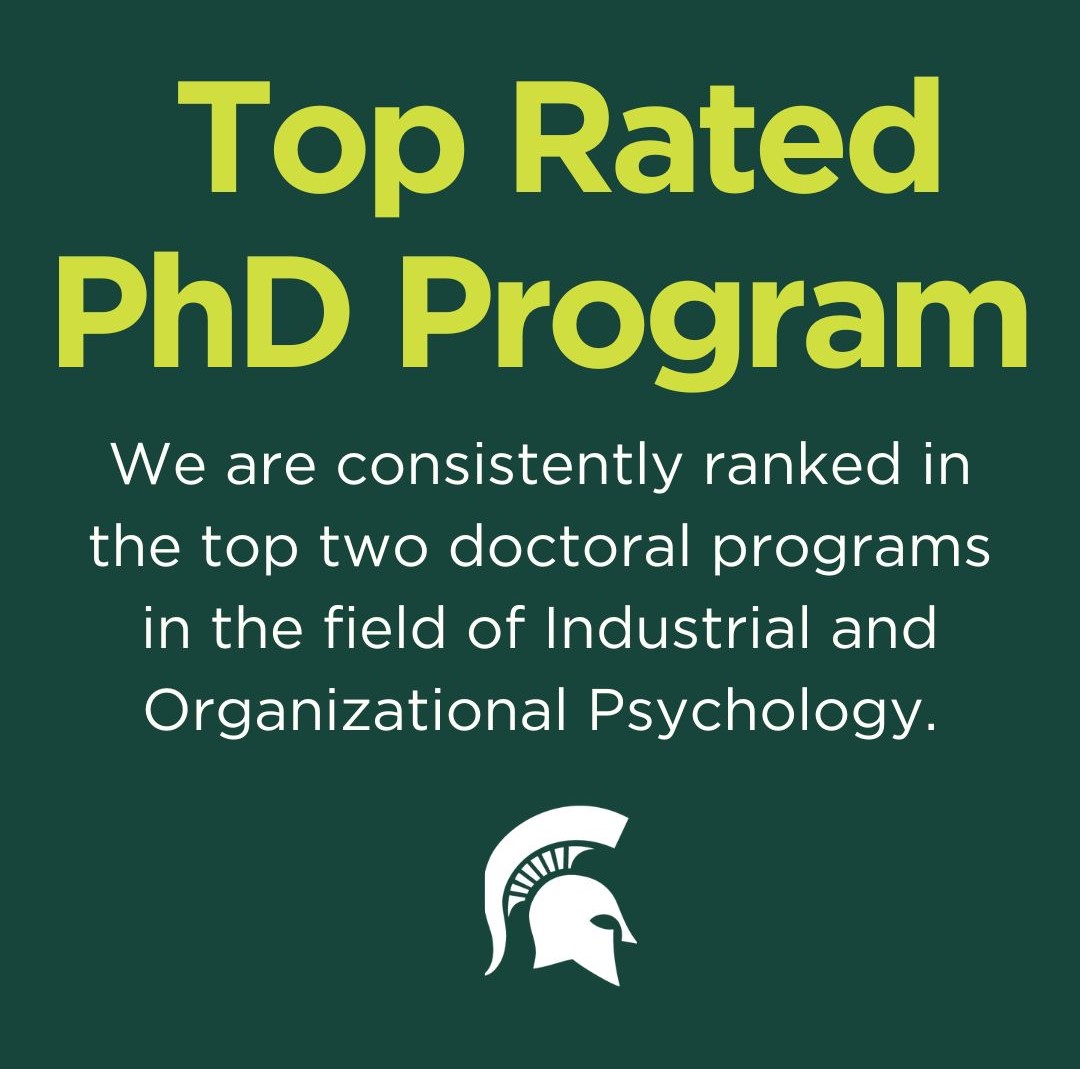Organizational Psychology
Want to better understand the workplace?
By using scientific methods and psychological theory, organizational psychologists make teams more productive, employee selection methods more effective and unbiased, and workplaces safer.
The MSU Organizational Psychology program has world-class faculty members who have made an impact in the field of Industrial and Organizational Psychology and in practical application in workplaces around the world.
We are proud of the outstanding Ph.D. alumni who are succeeding in both academia and practitioner roles and shaping workplace-related public policies.
Our philosophy
Our goal is to provide Ph.D. level training to students who intend to obtain faculty positions in universities or research-oriented positions in major corporations, government, or other organizations. Our program provides a strong background in psychology and quantitative methods, as well as organizational psychology curriculum.
Unique to our program is the excellent working relationships we have with the Department of Management, Eli Broad College of Business, and with the School of Labor and Industrial Relations. Students and faculty from these programs collaborate frequently in joint projects.


"I feel so fortunate to have been raised in a program where values of intellectual inquiry and honesty, creativity and innovation, and collaboration and inclusion were emphasized in our daily interactions. The multiple mentorship model meant that I could learn from some of the brightest minds in our field. I found warm, authentic, and life-long friendships at MSU, and look back at my doctoral experience with great fondness."
-Dia Chatterjee (2018), Assistant Professor at Baruch College
"While I was at MSU, I was able to really engage with the science, learn from some of the more prolific and cutting-edge scholars in the field, and apply what I had learned in real world settings. My time in the program provided excellent training for both academic and applied opportunities post-graduation."
-Jacob Bradburn (2020), People Analytics & Insights at Target
Frequently Asked Questions
-
How many students are in the program?
Usually there are around 15-20 students in the program at any one time. Some incoming cohorts have had only 2 or 3 students, others have had as many as 7 students. The number of students admitted each year depends on several factors, including how many returning students there will be and what sources of funding will be available. Maintaining a low student-faculty ratio is important to allow students frequent interaction with all faculty and to provide for close mentoring relationships.
-
How many classes do students typically take?
Students typically take two (3-credit) classes each semester, prior to their dissertation work. This allows for ample time for involvement in multiple research projects. In fall and spring semesters, students who have assistantships are typically waived tuition for nine credit hours; during summer session, five credit hours of tuition are typically waived. While a few summer courses are offered in related departments, most students take thesis or dissertation credits during the summer.
-
What are the classes students typically take?
Each class is usually one three-hour seminar each week. First-year students take a standard set of courses, including two courses that provide an introduction to the Organizational field, one statistics course, and one course in psychometric theory and test construction. Although students take a majority of their classes within Organizational psychology, students are allowed to participate in seminars in other areas that fit with their interests. In past semesters, students have taken courses in social psychology, management, cognitive psychology, communications, math, human development, and education.
-
How long does the graduate program take?
The graduate program is typically completed in five years. This offers students time to develop the skills it takes to be successful and to become involved in research and applied projects that are outside of their required assistantship work or coursework. Students begin working toward their master’s degree by completing a thesis sometime in their second and third years in the program. After the thesis, the student is admitted to the doctoral level of the program. In the third or fourth year, students complete comprehensive exams. When the student has passed this phase, work begins on the dissertation. After completion of a dissertation, the student receives the Ph.D. degree.
-
Will I be assigned to work with a particular professor, or will I get to choose whom to work with?
First-year students are assigned a “temporary advisor” to ensure that their transition is smooth. They are also assigned to work as a teaching or research assistant with a particular professor for their first year in the program. Students are required during their first semester to work on an additional project with a faculty member (a first year project). Students are then free to choose a more permanent advisor for thesis and dissertation work, and students are always encouraged to work with more than one faculty member on more than one research project throughout their time in the program, to gain more and varied experience in Organizational Psychology.
-
What is the mentoring approach at MSU?
Whereas many psychology programs use a direct mentoring approach, which assigns each graduate student to a single advisor, MSU’s Organizational students are selected into the program by the entire faculty. Students are not brought in to work with a single faculty member, but instead, gain a broad base of knowledge early in their graduate career by working with different faculty and eventually specialize over time. Students participate in different types of projects through their graduate careers: some involve one student with one faculty member, other projects involve collaborations of multiple students and/or multiple faculty members.
-
Will I receive a teaching or research assistantship?
Generally, all students who are admitted to MSU’s Organizational program receive either a teaching or research assistantship. MSU’s Organizational program has established a practice of only admitting the number of students that can be supported on a graduate assistantship through available funding. Specific information about funding offers is included in admission letters sent in the spring.
-
What is onboarding of new students like?
In addition to orientation sessions designed to familiarize students with the Psychology Department, program requirements, and getting to know more people at MSU, the Organizational Psychology program has some extended socialization experiences in the first year. New students are paired with an advanced student prior to arrival to ensure a smooth transition and a peer resource for answering questions. During the first year, new students participate in first year research projects that faculty members have developed to get involvement in research from Day One, as well as to engage students immediately in the research process. Those projects are connected to a weekly proseminar which provides one-on-one time with each faculty member in Organizational Psychology, Management, and HRLR to discuss career issues, research programs, and other general topics.
-
Are professors actively involved in research? How involved are the students in research?
The faculty members in MSU’s Organizational program are all actively involved in research. Some faculty members pursue more laboratory-oriented research, others are more focused on field research projects, and some are involved in both. All students are encouraged to work on research projects with the faculty members. Usually the role the student plays in the research depends on their interest and level of expertise. Student activity ranges from collecting laboratory data to participating in research plan development, and students are often encouraged to "take the lead" on various research projects.
-
What kind of applied work is done?
Professors regularly do work with outside organizations. Examples of recent applied projects include: selection system design, training program development, employee surveys, and evaluations of interventions to enhance productivity and satisfaction. In addition to gaining hands-on experience, the project teams often build some research questions into the project design, which enables them to produce research articles as well as technical reports. Often students’ research assistantships will involve an applied project.
-
Will I be required to do an internship?
While internships are not a required part of the doctoral program, students who are considering careers in applied settings are encouraged to seek an internship. Students who do intern usually take a position sometime during their fourth year, after completing comprehensive exams. Internships are not arranged by the faculty; students must actively and individually pursue internship positions with organizations and/or consulting firms. See HERE for information on recent student internship experiences.
-
Where are recent graduates employed?
Graduates of MSU’s Organizational Ph.D. program are employed at a variety of organizations, consulting firms, and universities. See here for information on alums.
-
Do students attend or present research at professional conferences?
Each year students attend the Society for Industrial and Organizational Psychology (SIOP) annual conference. Most students present one or more academic research papers, or contribute to a symposium presentation of their research. See HERE for information on recent presentations. Some students also attend and present research at the Academy of Management annual conference.
-
Do students publish research in professional and scientific journals?
MSU students regularly submit research articles to top-tier scientific journals and are often published. While many publications are generated by a group working together on a research project, students also have authored articles based on their dissertation, thesis, or class research papers. Student publications can be found in such journals as the Journal of Applied Psychology, Personnel Psychology, and Organizational Behavior and Human Decision Processes. See the students' individual directory pages for more information on student research activity.



